Published: 03 Januari 2010; Intelligence and Terrorism Information Center
The Riots of Ashura 2009: yet another expression of the ongoing conflict between government supporters and the reformist oppostion in Iran.
Iran’s ongoing political crisis, which began following the presidential elections, spread to the Shi’ite mourning rituals (Tasu’a and Ashura) marked early last week. Alongside traditional mourning processions held early last week across Iran with the approval and support of the authorities, severe clashes broke out in various areas in Tehran and in other major Iranian cities between security forces and protestors who sought to take advantage of the mourning processions to express support of the opposition.
During the two days of mourning (December 26-27), Rah-e Sabz, a news website affiliated with the supporters of the reformist opposition leader Mir-Hossein Mousavi, extensively reported on severe clashes between security forces and opposition demonstrators in which at least eight demonstrators were killed, including Seyyed Ali Mousavi, the 35-year old nephew of opposition leader Mir-Hossein Mousavi. The internal security forces shot in the air and used tear gas to disperse the demonstrators, who chanted slogans in favor of the reformist opposition and against the regime (Rah-e Sabz, December 26-27).
More mass arrests of reformist activists were made by the authorities following the riots. Those reportedly arrested in recent days include Ebrahim Yazdi, chairman of the Iranian oppositionist organization “The Freedom Movement”; Emadeddin Baqi, a journalist and human rights activist; Mashallah Shamsolvaezin, a journalist and spokesman for the organization for protecting freedom of press; as well as senior officials in Mir-Hossein Mousavi’s headquarters.
In a related incident, on the evening of December 26 government supporters broke into the auditorium of Jamaran Religious Center in northern Tehran while former president Mohammad Khatami was giving a speech on the occasion of the Ashura, forcing him to leave before he had the chance to finish his speech.
httpv://www.youtube.com/watch?v=HV6GQoJm59E
Unlike the reformist websites, reports by official and pro-government media played down the protest demonstrations, preferring to focus on the traditional mourning processions. The official news agency IRNA reported on December 26 that internal security forces had deployed in downtown Tehran to maintain public order, and that a small group consisting of only 150 protestors attempted to disrupt public order during the mourning processions and was dispersed by the security forces on its way from the Imam Hossein Square to Revolution Square in downtown Tehran (IRNA, December 26).
In the wake of the Ashura riots, pro-government media have once again lashed out against the reformist opposition and its leaders. In an editorial published by Keyhan on Monday, December 28, the conservative daily accused the opposition leaders of cooperating with foreign intelligence services as part of a thought-out project to undermine Iran’s stability and spark a civil war. The Ashura events, the article says, demonstrate that Iranians have lost their patience for the opposition’s activities and are even more determined than the security forces to stand up to it and take strong action against it. According to the article, the opposition leaders must keep in mind that they are responsible for all developments, and they will soon have to pay the price for their actions. In another article by Hossein Shariatmadari, the editor-in-chief of Keyhan referred to the reformist opposition leaders as “servants of Israel”, affiliated with Zionist circles and acting as Israel’s fifth column inside Iran. Their crimes during the events of Ashura are no different than those perpetrated in AD 680 by Yazid Ibn Mu ‘awiyah in the Battle of Karbala, leaving no room for doubt that they are the enemies of Islam, Imam (Khomeini), the regime, and the people. From now on, Shariatmadari writes, the masses will not remain silent about the incitement-spreading and outlaw leaders (Keyhan, December 29).
Fars news agency accused the opposition leaders of abusing the religious sentiments of the public during the Shi’ite days of mourning to further their political objectives. The news agency also questioned the deaths of several demonstrators during the clashes, including the nephew of Mir-Hossein Mousavi. Citing the internal security forces chief, the agency reported that no live ammunition had been fired at the demonstrators, insinuating that the opposition was responsible for the deaths of the demonstrators killed in the clashes in order to garner public support (Fars, December 27).
Ayatollah Ahmad Khatami, a senior cleric and Friday prayer leader in Tehran, also lashed out strongly against the violators of public order during the Ashura ceremonies, accusing them of an attempt to undermine the Iranian concept of “rule of the religious jurisprudent” and to personally fight against the Supreme Leader. In an interview granted to Fars news agency, Khatami said that the Ashura riots were part of a sequence of plots planned well before the presidential elections in order to undermine the stability of the regime. He called on the authorities to take strong, resolute action against those who disrupted public order, accusing them of offending the sanctity of Islam and the sanctity of Ashura in recent days (Fars, December 28).
In a special memorandum of opinion published in the wake of the Ashura riots, the Revolutionary Guards also condemned the violations of public order which took place during that day. Offending the sanctity of the Ashura reflects the dead end in which the “internal and external global anti-revolutionary arrogance” found itself following its attempts to achieve its objectives, the memorandum of opinion says, and the activity of the public order violators is proof of their affiliation with Iran’s external enemies. The attempts of foreign and Zionist media to encourage offending the sanctity of the Ashura will not compromise, however, the resolve of the Iranian people to protect their sacred religious and revolutionary values, making them even more determined to thwart the plots concocted against them. In the memorandum of opinion, the Revolutionary Guards warn the planners of the riots that sooner or later they will have to pay the price for offending the sacred values of the Iranian nation (Fars, December 28).
Meanwhile, government supporters held demonstrations and processions on Tuesday and Wednesday (December 29-30) in a number of Iranian cities, in protest against “offending the sanctity of Ashura”.
Mazzeltov,
Crethi Plethi



 RSS
RSS

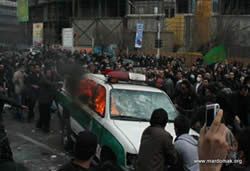
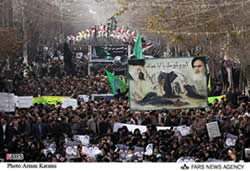
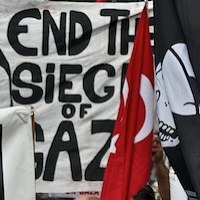
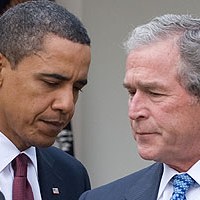
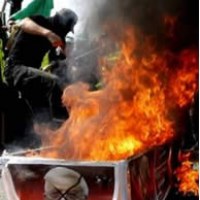
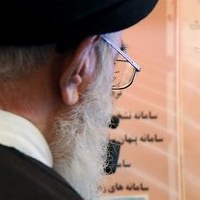
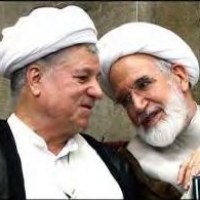




[…] two days ago. State television has been attempting to blame Bahais for responsibility for the Ashura riots. after initially blaming […]
[…] full translation of the RAHANA report HRANA Report A similar HRANA report Background: Ashura riots, initially blamed on […]
[…] full translation of the RAHANA report HRANA Report A similar HRANA report Background: Ashura riots, initially blamed on Germany. Possibly related posts: (automatically generated)Iran Crackdown […]